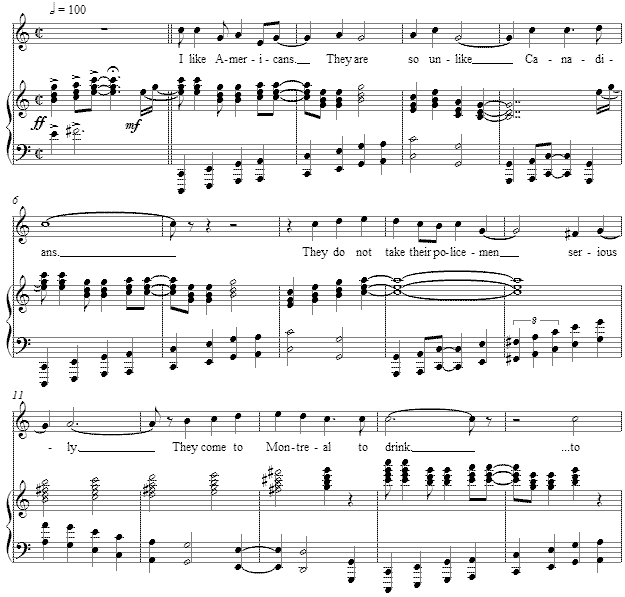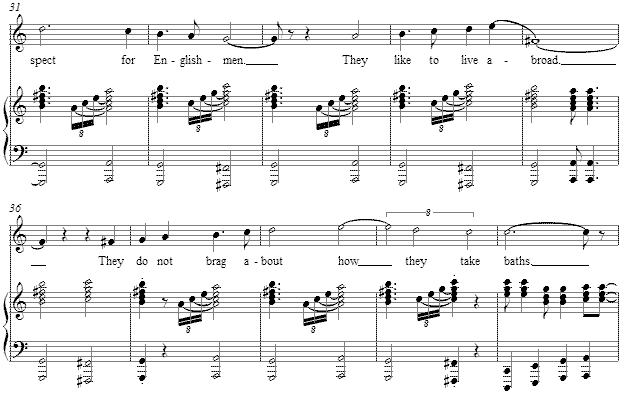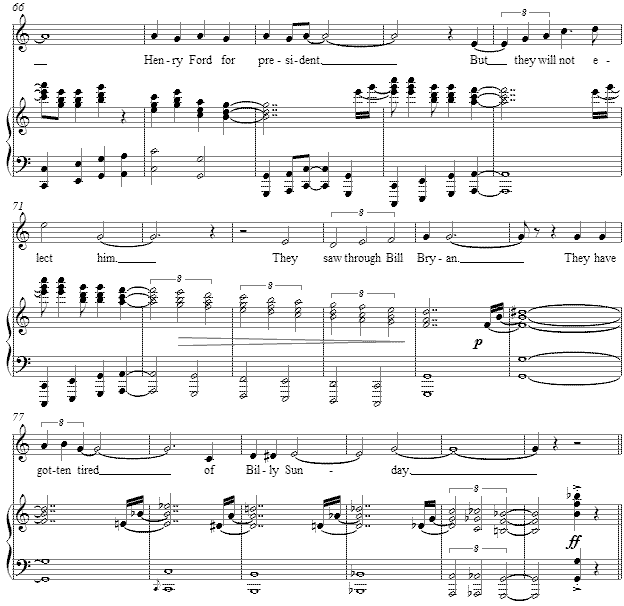Music and Texts of GARY BACHLUND
Vocal Music | Piano | Organ | Chamber Music | Orchestral | Articles and Commentary | Poems and Stories | Miscellany | FAQs
I Like Americans - (2007)

Ernest Hemingway
for medium voice and piano
I like Americans.
They are so unlike Canadians.
They do not take their policemen seriously.
They come to Montreal to drink.
Not to criticize.
They claim they won the war.
But they know at heart that they didn't.
They have such respect for Englishmen.
They like to live abroad.
They do not brag about how they take baths.
But they take them.
Their teeth are so good.
And they wear B.V.D.'s all the year round.
I wish they didn't brag about it.
They have the second best navy in the world.
But they never mention it.
They would like to have Henry Ford for president.
But they will not elect him.
They saw through Bill Bryan.
They have gotten tired of Billy Sunday.
Their men have such funny hair cuts.
They are hard to suck in on Europe.
They have been there once.
They produced Barney Google, Mutt and Jeff.
And Jiggs.
They do not hang lady murderers.
They put them in vaudeville.
They read the Saturday Evening Post
And believe in Santa Claus.
When they make money
They make a lot of money.
They are fine people.[ 7 pages, circa 3' 00" ]
Ernest Hemingway
First published under the pseudonym, By a Foreigner, in the Toronto Star Weekly in 1923, this poetic rendering is a set of short, terse sentences, something like reporting and something like poetry as well. For more on Hemingway, please see Montparnasse (1920), a setting of another of his early early poems.
Hemingway writes of Americans, "They come to Montreal to drink. Not to criticize." According to the Canadian Encyclopedia, Edmonton, Hurtig, 1988, as to the disastrous experimentation with prohibition in the United States, "Québec rejected [prohibition] as early as 1919 and became known as the 'sinkhole' of N[orth] America, but tourists flocked to 'historic old Québec' and the provincial government reaped huge profits from the sale of booze." Some things seem not to change, as the current enthusiasm for prohibiting smoking is beginning to undermine government revenues from tobacco sales which has been planned to support various health programs, in another odd "kill the golden goose" game wherein government sees itself as source for moral and medical authority, thereby undermining freedom. Even so, smokers in some states bordering on Canada found smuggling to undercut state taxes a profitable adventure. This continues with pharmaceuticals coming from Canada which undercut the controlled market in drugs in the U. S. "La plus change, la plus même chose."
Hemingway's reference to "B.V.D.'s" is to a particular maker of underwear whose trademark was the abbreviation; BVD, founded in 1876 by three gentlemen, Messrs. Bradley, Voorhees and Day, was one of the most famous and historically innovative brands in America, and the expression remains in the patois of American English. American entrepreneur Henry Ford (1863-1947) used the newly invented assembly line to manufacture automobiles, creating the Ford Motor Company, and" Bill Bryan" refers to William Jennings Bryan (1860-1925), an American lawyer and politician who lost his bid for U.S. Presidency. "Billy Sunday" was the popular name for William Ashley Sunday (1862-1935), an American evangelist who ran revivals throughout the country.
Hemingway writes of Americans, "They are hard to suck in on Europe. They have been there once." "Suck in" means to trick, or to deceive. The reference to "once" refers to the United States' involvement in World War I under President Woodrow Wilson, an avowed pacifist who nonetheless was forced to assist free nations in Europe by means of America's military and industrial might. This reference also explains the "second best navy in the world," for later the U. S. again came to free Europe's aid and thereby built the best navy in that time out of sheer necessity.


"Barney Google," "Mutt and Jeff," and "Jiggs" were all popular American newspaper comic strip characters in the era from 1910-1920.
Set for medium voice, the song begins with a syncopation to capture the text, "I like Americans." Though marked
, the tempo is better described as that by which the singer might best enunciate the text clearly.
A change in accompaniment texture stands as a second section of the song setting, with its arpeggios and opposite motion breaking the insistent syncopated accompaniment for a short while.
A release of the rhythmic drive comes as the text speaks of Americans "seeing through" various issues, especially as regards politics and religion. Again, as in the time when Hemingway wrote this text, it seems as if things have not changed significantly in terms of an abiding American skepticism for political movements, especially of an internationalist sort, and the faults which so easily hide behind a mask of religion.
Hemingway wrote a companion piece under the same pseudonym, By a Foreigner, titled "I Like Canadians." It too was published in the Toronto Star Weekly. Should one imagine that a Canadian composer might someday set this text? Shall I? The text is also included below, for amusement.
The score to I Like Americans in the medium key is available as a free PDF download, though any major commercial performance or recording of the work is prohibited without prior arrangement with the composer. Click on the graphic below for this piano-vocal score.
NOTES
I Like Canadians
By A Foreigner
I like Canadians.
They are so unlike Americans.
They go home at night.
Their cigarets don't smell bad.
Their hats fit.
They really believe that they won the war.
They don't believe in Literature.
They think Art has been exaggerated.
But they are wonderful on ice skates.
A few of them are very rich.
But when they are rich they buy more horses
Than motor cars.
Chicago calls Toronto a puritan town.
But both boxing and horse-racing are illegal
In Chicago.
Nobody works on Sunday.
Nobody.
That doesn't make me mad.
There is only one Woodbine.
But were you ever at Blue Bonnets?
If you kill somebody with a motor car in Ontario
You are liable to go to jail.
So it isn't done.
There have been over 500 people killed by motor cars
In Chicago
So far this year.
It is hard to get rich in Canada.
But it is easy to make money.
There are too many tea rooms.
But, then, there are no cabarets.
If you tip a waiter a quarter
He says "Thank you."
Instead of calling the bouncer.
They let women stand up in the street cars.
Even if they are good-looking.
They are all in a hurry to get home to supper
And their radio sets.
They are a fine people.
I like them.





